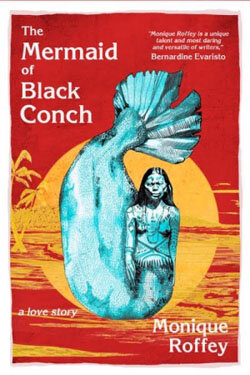This may be a novel about a mermaid but it's definitely not a Disney tale. At the centre of this story is the destructive effects of female jealousy, the dizzying impact of heartfelt passion and the deleterious legacy of colonialism on a fictional Caribbean island. Monique Roffey is a writer whose work I enthusiastically follow because her books are so varied and creative. The three I've read previously “The White Woman on the Green Bicycle”, “House of Ashes” and “The Tryst” each use inventive stories to approach different social, political and emotional subject matter. I was also inspired to read this new novel since I've joined in #Caribathon, an online readathon of Caribbean literature.
“The Mermaid of Black Conch” is subtitled “a love story” as it chronicles three different kinds of romance in the village of St Constance. A Rasta fisherman falls in love with a cursed mermaid; after a ten year separation a white proprietress is reunited with the black man she fell in love with in her youth; and the local female gossipmonger seduces a corrupt policeman again to draw him into her troublemaking scheme. Their tales are dramatized to give a dynamic portrait of love when it's impacted by time, greed, race and the historical consequences of slavery/colonialism. But at the centre of this novel is the fantastical story of Aycayia, an indigenous woman that was cursed by the village women long ago because she was perceived to be a beautiful threat. For centuries she's lived a lonely existence in the ocean as a mermaid. When Aycayia is caught by American tourists on a fishing expedition the village is thrown into an uproar as they alternately befriend, abuse or seek to capitalize on this discovery. Meanwhile, a hurricane is brewing that threatens upturn the whole island.
Roffey's writing is very evocative as it brings to life the beautiful natural environment of the Caribbean, but also the brutality and violence of its changeable weather. This is also a landscape whose society has been shaped by and lives with the after-effects of slavery “The Black Power revolution had happened over in Port Isabella, and the Prime Minister had long ago said 'Massa day done' and yet little had changed in Black Conch since then. Same old... White families still owned land like they used to”. Miss Rain is an ornery white woman whose ancestors have lived on the island for generations. She's inherited a large house and most of the property in the village yet has a very uncomfortable relationship to her privilege. She keeps to herself reading and teaching her deaf son. When Aycayia enters her life she acts like a touchstone to an age long before the horrors of colonialism. In this way her abrupt presence acts like a catalyst for some of the characters to transcend the past. But it's poignant how Roffey writes about the slow transition involved in changing longstanding inequalities: “change came as change always comes, from a chain of events with a long history, too long to see from back to front, till it come.”
The narrative is formed of a few different elements where the main story is interspersed with journal entries and the thoughts of Aycayia herself. David Baptiste, a sincere-hearted fisherman falls in love and protects the mermaid who gradually changes back into a young woman. It's a necessarily messy transition. Roffey vividly describes the way the mermaid's sea self gradually falls away and her struggle to walk and speak. But it's also moving the way she forms an intense romantic connection with David and a friendship with Reggie, Miss Rain's deaf son. Although many of the characters can be identified on a scale of “goodness” to “badness” they are all fully rounded with their own complexities and peculiarities. Even the portrayal of the American fisherman's son Hank is quite dynamic as he's someone who suffers under the burden of his father's toxic masculinity. One of the things I appreciate most about Roffey's writing is its sympathetic frankness in depicting these characters' sexuality and the honest way they wrestle with their own internalised prejudices. This is the kind of sex-positive, non-judgemental storytelling which opens up dialogue and helps the reader to think about these subjects from a variety of angles.
This novel is also a romance in the way it playfully engages with folklore and legends. It gave me similar vibes to what I felt reading Madeline Miller's novel “Circe”. The author's note at the back of Roffey's book describes how “Myths of mermaids, sirens, exist in every part of the world, often young women cursed by other women.” There's a melancholy comfort in entering the consciousness of someone cursed to dwell at the bottom of the sea for hundreds of years where loneliness becomes a companion so dear it's like an addiction. Once on land Aycayia muses “I was lonely / I missed the sea. I missed my loneliness.” So I felt a powerful affection for this character who has been so unfairly maligned and damned to such a solitary existence. But it's also inspiring the way the author portrays her quiet power, hidden passion and delicious ability to unsettle the world.








